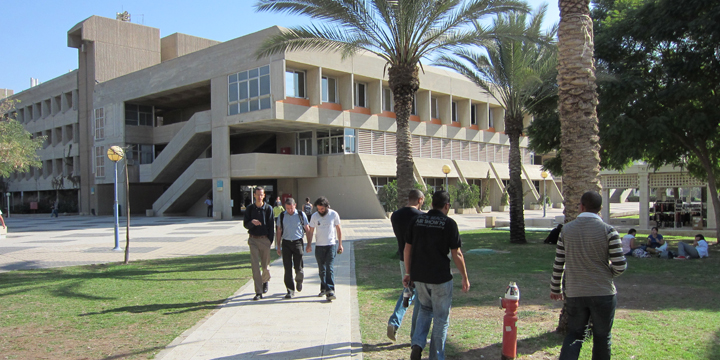Enrollment of Arab Students in Israeli Universities Increases 79 Percent in Seven Years
 by Shiri Moshe
by Shiri Moshe

Ben Gurion University of the Negev. Photo: David Saranga/Israel Ministry of Foreign Affairs.
The number of Arab students attending Israeli colleges and universities increased by nearly 79 percent over the past seven years — a dramatic advance for a demographic that has traditionally lagged behind its Jewish counterpart in levels of educational attainment.
Arab students made up 16.1 percent of Israel’s total undergraduate population in 2017, a 60 percent rise from 2010, according to a recent survey released by Israel’s Council for Higher Education (CHE). In the same time period, they grew to account for 13 percent of students seeking master’s degrees — an increase from 6.5 percent — and 6.3 percent of those in doctoral programs, up from 3.9 percent.
Overall, 46,855 Arab students were enrolled in degree-seeking programs in 2017, compared to 26,214 in 2010.
Despite these gains, Israeli Arabs — a diverse population that constitutes about 21 percent of Israeli citizens, and 26 percent of the age group that typically seeks an undergraduate degree — are still underrepresented in higher education. Their absence is particularly pronounced in fields related to the high-tech and business sectors, including natural sciences, architecture, and business administration.
In a bid to address such disparities, the Israeli government approved a 5-year, NIS 15 billion plan to develop the Arab sector in 2015. The CHE specifically invested “about NIS 1 billion” in recent years to improve Arab students’ access to higher education, said Yaffa Zilbershats, a law professor at Bar-Ilan University and head of the CHE’s planning and budgeting committee.
As part of the effort, institutions funded by the CHE operate academic, career, and social support programs for Arab students. Some 775 Arab students are also awarded scholarships each year based on their socioeconomic status and preferred field of study, which support them until graduation.
While this has resulted in considerable improvements on some fronts, “among the Bedouin population in the Negev, the figures are significantly low and insufficient,” Zilbershats pointed out. “We will continue to invest substantial resources in the coming years in order to integrate Arab students in general and Bedouin students in particular, including academic, economic, social and personal support in a wide variety of subjects.”
Last year, the CHE announced plans to integrate more Bedouins into the higher education system, with a goal of enrolling at least 1,500 such students in 2022. Bedouin communities are at the bottom of the socioeconomic scale in Israel, and the “proportion of unschooled individuals in the Bedouin society (approximately 10%) is nearly twice as high as in the entire Arab population and nearly 5 times as high as in Jewish society,” the CHE detailed in a 2013 report.
The Inter-Agency Task Force on Israeli Arab Issues — supported by a coalition of North American Jewish groups — observed in a July 2017 report that Israeli Arab youth “have high dropout and ‘covert dropout’ rates (sparse attendance and participation), with over 20% not completing high school.”
Of those that do graduate, “only 32% complete a matriculation certificate at a level applicable for higher education compared to 59% of Jewish students,” the Task Force wrote.
 US Stops UN From Recognizing a Palestinian State Through Membership
US Stops UN From Recognizing a Palestinian State Through Membership Jordan Reaffirms Commitment to Peace With Israel After Iran Attack, Says Ending Treaty Would Hurt Palestinians
Jordan Reaffirms Commitment to Peace With Israel After Iran Attack, Says Ending Treaty Would Hurt Palestinians ‘Crisis at Columbia’: Elite University Spirals Into Chaos Against Backdrop of School President’s DC Testimony
‘Crisis at Columbia’: Elite University Spirals Into Chaos Against Backdrop of School President’s DC Testimony ‘A Time for Vigilance’: FBI Director Says Agency on Alert for Threats Against Jewish Community During Passover
‘A Time for Vigilance’: FBI Director Says Agency on Alert for Threats Against Jewish Community During Passover New Haggadah Released for Israeli Soldiers in Gaza Ahead of Passover
New Haggadah Released for Israeli Soldiers in Gaza Ahead of Passover ADL Data Reveals Alarming Campus Antisemitism, Despite Strong Jewish Life
ADL Data Reveals Alarming Campus Antisemitism, Despite Strong Jewish Life New Hospital Approved for Construction in Southern Israel Amid Gaza War
New Hospital Approved for Construction in Southern Israel Amid Gaza War UN Security Council to Vote Thursday on Palestinian UN Membership
UN Security Council to Vote Thursday on Palestinian UN Membership New Play Opening in NY Recounts Verbatim Testimonies From Oct. 7 Survivors, Families of Victims
New Play Opening in NY Recounts Verbatim Testimonies From Oct. 7 Survivors, Families of Victims



 New Haggadah Released for Israeli Soldiers in Gaza Ahead of Passover
New Haggadah Released for Israeli Soldiers in Gaza Ahead of Passover Google Fires 28 Employees for Protesting Cloud Contract With Israel, Impeding Others’ Work
Google Fires 28 Employees for Protesting Cloud Contract With Israel, Impeding Others’ Work US to Oppose Palestinian Bid for Full UN Membership
US to Oppose Palestinian Bid for Full UN Membership US Announces New Sanctions on Iran After Missile, Drone Strike on Israel
US Announces New Sanctions on Iran After Missile, Drone Strike on Israel ‘A Time for Vigilance’: FBI Director Says Agency on Alert for Threats Against Jewish Community During Passover
‘A Time for Vigilance’: FBI Director Says Agency on Alert for Threats Against Jewish Community During Passover